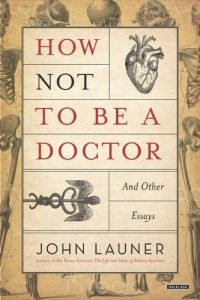 John Launer is a GP and medical educator. The fifty entertaining and stimulating essays collected in How Not to be a Doctor were all first published in the Postgraduate Medical Journal and the Quarterly Journal of Medicine. They are well worth dipping into.
John Launer is a GP and medical educator. The fifty entertaining and stimulating essays collected in How Not to be a Doctor were all first published in the Postgraduate Medical Journal and the Quarterly Journal of Medicine. They are well worth dipping into.
Launer is a passionate advocate of the importance of patient stories. This means not just careful listening and interpretation of stories for clinical and diagnostic purposes, but also enabling patients to construct stories to make sense of their lives.
There are several essays about important questions for doctors to ask in the consultation process. He gives several clinical examples, including one occasion when he was himself a patient: his chest specialist asked Launer ‘have you come up with any diagnosis yourself?’ for his shortness of breath, and as a result sent Launer for a scan which possibly saved his life. Another essay mentions an occasion when a patient came in to see him and said, “I’ve got three problems” to which Launer intuitively replied, “what’s the fourth?”, thereby starting a conversation about the symptoms that most worried her.
In some cases he stresses the importance of being an intelligent, empathetic and insightful listener, able to draw out these stories with such appropriate questions. But in several essays he suggests that the very act of putting a stories into words is often more important for the patient than being listened to. In his essay on interpreters, called ‘Interpreting Illness’, he relates his experiences of interpreters in clinical practice, noting that patients are sometimes resentful of having to stop their flow for the interpreter to report back to the doctor. ‘It appears that patients want quite literally to be heard, and they may care relatively little whether the main hearer is someone with medical skills or not.’ Launer is aware that many doctors would feel uncomfortable sitting back and allowing minutes to pass without understanding anything, for fear of missing something of medical significance. But there is something of the sociologist or psychotherapist about him, and he sees a greater role for illness narratives than simply giving the doctor information with which to make a diagnosis. In this sense, it is the person constructing the story that is doing the interpreting.
His words may serve as an important parallel to the reviews on this website. For such narratives ‘allow patients, through the very act of speaking, to fashion their memories and sensations into a coherent shape. They provide people with opportunities to assign causation, purpose and direction to their experiences, and to claim moral legitimacy for their own actions. Like all personal narratives, they enable people to describe who they are, to discover who they are becoming, and to define who they wish to be.’
For Launer the conclusion is that an interpreter may be as useful, and perhaps better, than the doctor as a listener, while the patient constructs and articulates their story. Whether clinicians or not, we should not feel a need to justify time spent listening to people’s stories, even if not all elements of the story are needed for diagnosis and for selecting appropriate treatment, since the very act of telling the story allows the speaker to regain some control over their life.
John Launer (2018) How not to be a doctor, and other essays, London, Duckworth Overlook